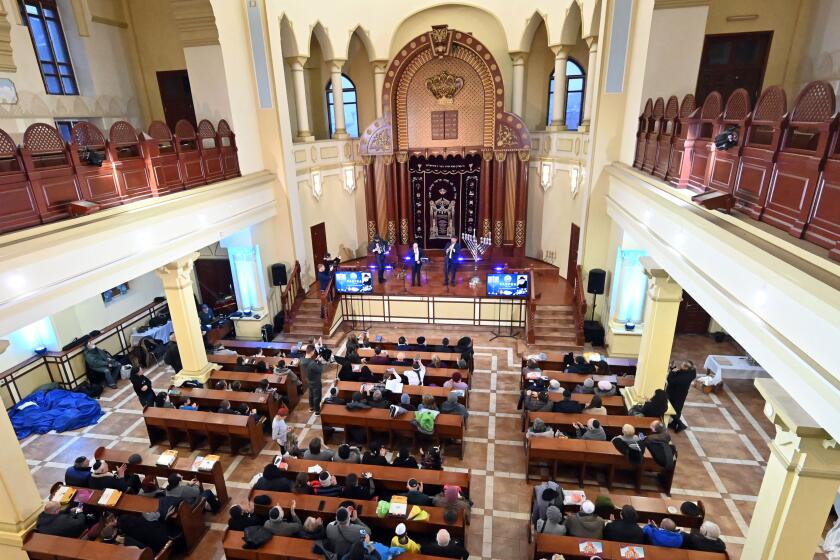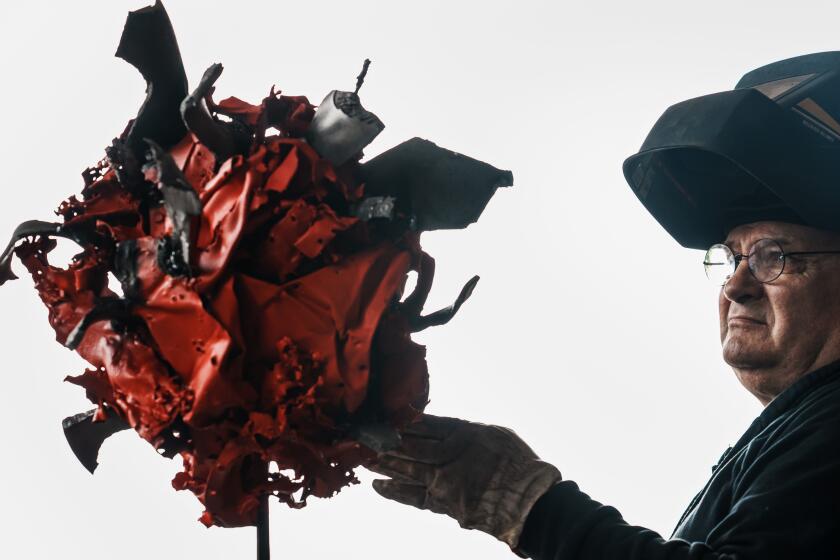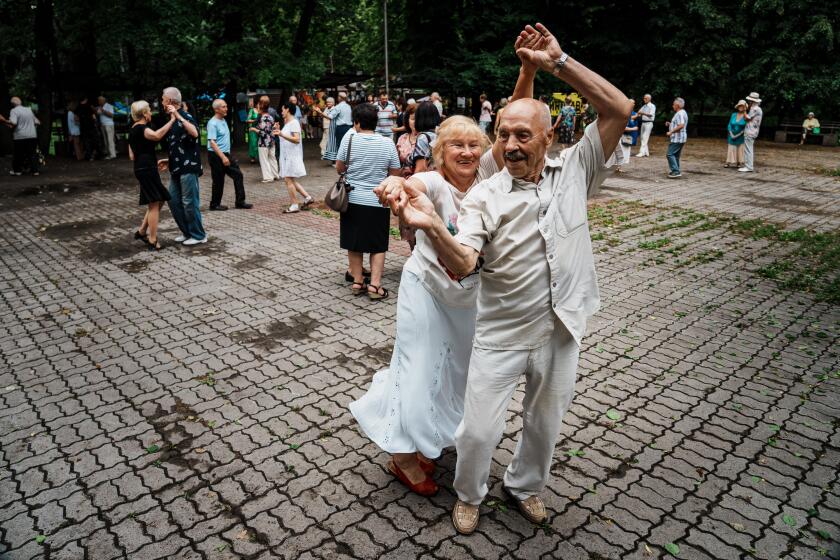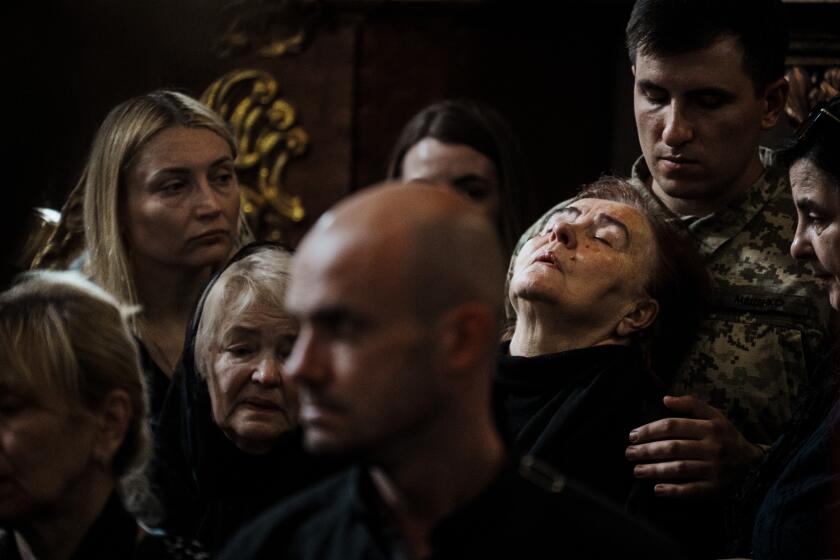Ukrainians are grateful for U.S. military aid. But some ask whether they deserve thanks too
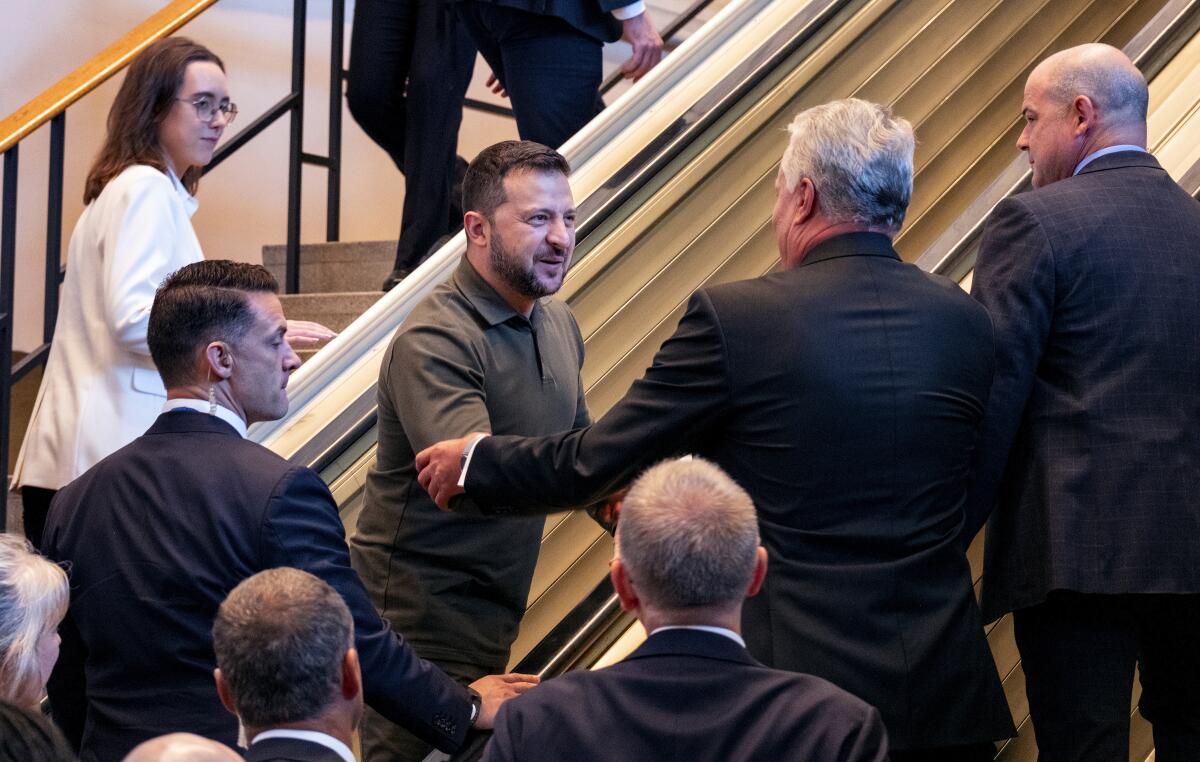
KYIV, Ukraine — How thankful is thankful enough?
With Ukraine locked in a slow, bloody war with Russian troops who hold a fifth of its territory, President Volodymyr Zelensky, set to visit the White House Thursday, is treading a delicate path as he presses for more U.S. military aid.
In the rain-soaked streets of the Ukrainian capital, the question of whether American support will remain steadfast weighed on people even as they hurried about their morning business.
“We worry about what will happen next,” said Nataliya Antoniuk, a 35-year-old who works in a bank. “We are not sure if everyone understands how difficult it is.”
Over the course of 19 months of fighting, even some close allies have occasionally grumbled that Ukraine doesn’t seem sufficiently grateful for the billions of dollars in assistance it has received.
Back in July, on the sidelines of an at-times-contentious NATO summit, Britain’s then-defense secretary, Ben Wallace, observed snappishly that “we’re not Amazon” when it comes to fulfilling Ukrainian needs.
In a Ukrainian city devastated by bombing, the seasons of Jewish life find expression. Amid the sorrow of war, Rosh Hashana brings hope, even joy.
While there is immense appreciation within Ukraine for all the United States and its allies have done to help fend off the 2022 Russian invasion, many here also feel that the West should express more gratitude to Ukraine for its valiant fight against Russian President Vladimir Putin and the threat he poses to Europe and the world order.
“To be honest, it’s weird,” said Mark Savchuk, a leader of a Ukrainian civil activists group combating government corruption. “We absolutely understand that without all that support, we’d be dead already. So of course we’re thankful! But Putin is a huge danger to everyone.”
At the United Nations, Zelensky said as much in his address Tuesday to the General Assembly, declaring that Russia’s war is “not only about Ukraine.”
Putin’s goal, he said, was to “turn our land, our people, our lives, our resources, into a weapon against you — against the international rules-based order.”
Zelensky, who has proved himself a wartime leader of uncommon abilities, is a canny communicator, and some Ukrainian analysts see a careful calibration of his tone, particularly as some Republican lawmakers are overtly critical of aid to Ukraine.
When Secretary of State Antony J. Blinken came to the Ukrainian capital two weeks ago, Zelensky, greeting him, issued rapid-fire volleys of appreciation.
“Thank you so much — we are really thankful to you,” he said, before launching into an even longer litany of gratitude.
This Ukrainian artist was known for whimsical sculptures. Now, amid Russia’s war on Ukraine, he creates art from war debris, military weapons and fury.
The dynamic can be an uneasy one. As a cultural expression, excessive and elaborate thanks can sometimes be read in Ukraine as insincere, analysts said. Moreover, in many post-Soviet societies, “politeness in general is not always the strongest point,” said Alyona Getmanchuk, the founder and director of the Kyiv-based New Europe Center.
The Ukrainian president is “definitely tailoring his message” to be “less critical, expressing more gratitude for major partners who provided support,” she said.
“The funny thing is that in reality, Ukrainians are very grateful for the support we have received so far,” Getmanchuk said. But she added that etiquette can’t always be the point.
“By just saying ‘thank you’ without articulating our needs to succeed on the battlefield, we will lose the war,” she said.
At a fraught juncture in the fighting, just how forcefully Ukraine should make its case for more robust and timely help has become a sore point. Zelensky and his aides believe that foot-dragging by some allies — including, at times, the United States — set the stage for difficulties as the nearly 4-month-old counteroffensive has unfolded in the country’s east and south.
How do citizens of Kyiv cope with the sleep deprivation and stress from Russia’s war on Ukraine? Some push it down, some try yoga or dancing.
The closely watched campaign so far has failed to yield dramatic results, and Ukraine is frustrated that in some quarters, the slow pace of territorial gains is fueling calls to pull back on support, rather than increase it.
Some Western analysts have been outspoken in their view that as Ukraine struggles on the battlefield, a lack of urgency in providing weaponry has contributed to an inability to break through a maze of deeply entrenched Russian fortifications.
“It has obviously been quite slow going,” said Nick Reynolds, a land-warfare expert at Britain’s Royal United Services Institute, a defense think tank. “Probably expectations were set too high beforehand, and the Ukrainian government did play into that, as well as pressure from outside.”
With the largest war in Europe since World War II unfolding, Reynolds said, “one would have thought more urgency could have been adopted — we’re seeing the results of significant delay.”
Some weaponry earmarked for the current offensive, he said, arrived broken, with missing parts or manuals, making it “incredibly difficult for the Ukrainian military to absorb that equipment.”
There’s one area where gratitude — Zelensky’s and that of the Ukrainian public — is unstinting: toward troops in the field.
On arriving in the United States, the Ukrainian leader’s first stop was to visit soldiers undergoing rehabilitative surgery for grievous war wounds — an expression of appreciation for their care and to the fighters themselves.
Even far from Ukraine’s front lines, military funerals set off waves of mourning. ‘You can’t see an end to it,’ one chaplain says as the war drags on.
The toll of war has been heavy. A poll released earlier this year said that nearly 80% of Ukrainians now have a friend or relative who has been killed or hurt in the conflict. Millions remain displaced, scattered throughout neighboring European countries or taking refuge away from the front lines in safer parts of Ukraine.
Everyone who is part of the war effort, from public sector workers to emergency service personnel, gets periodic shout-outs from the president. Across the country, workers have been rushing to harden the power grid against expected Russian attacks over the winter.
For most people, even far from the front lines, the reminders are everywhere. In central Kyiv, commuters threaded their way through an open-air photo exhibition set up months ago on a cobblestone square outside St. Sophia, a landmark cathedral.
There are oversized portraits, with names and dates of birth and death on the battlefield — young and old, men and women, pictured in combat gear and civilian clothes, dangling a grenade or petting a puppy.
“I walk past this every day,” said Antoniuk, the bank worker. “Sometimes it seems their eyes follow you.”
As scenes of Zelensky’s U.S. visit played out on TV screens with lowered sound, a Kyiv barista caught an unmistakable American accent along with an espresso order.
“U.S.A.?” he said, handing over a small, steaming cup. “Thank you.”
More to Read
Sign up for Essential California
The most important California stories and recommendations in your inbox every morning.
You may occasionally receive promotional content from the Los Angeles Times.
